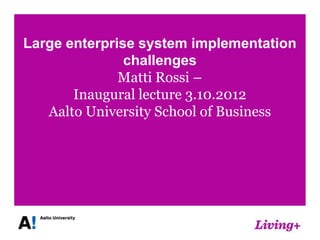Matti rossi prof erp 03102012
- 1. Large enterprise system implementation challenges Matti Rossi ŌĆō Inaugural lecture 3.10.2012 Aalto University School of Business
- 2. Excerpts from Bio ŌĆó Editor in chief of Communications of the Association for Information Systems ŌĆó One year visits to Georgia State Univ., RSM Erasmus and Claremont Graduate College ŌĆó Minority owner and former board member of MetaCase Consulting (www.metacase.com) a spin off of the thesis project
- 3. Introduction Enterprise system (ES): ŌĆó Integrates and standardizes the core business processes and information resources of the whole organization ŌĆó Provides a single system that allows information to be shared across all functional and management levels ŌĆó Provides unified data definitions and semantics across an organization ŌĆó Provides standardized processes and user interfaces across the organization
- 4. Major disasters and challenged projects ŌĆó Finnish national railways ticketing system (2011) ŌĆó Finnish national electronic patient record system and database (2002 ŌĆō ) ŌĆó Ajoneuvorekisteri (2000 ŌĆō 2011) ŌĆó ŌĆ” ŌĆó Taurus: London Stock Exchange System, developed for 10 years, at the cost of 700 mil ┬Ż, and never deployed (1983 ŌĆō 1993) ŌĆó Nearly all major public sector IT initiatives in last 10 years have been seriously delayed and/or have exceeded their budgets
- 5. Typical problems ŌĆó Delays e.g. New Taurus project manager after 5 years of development: ŌĆ£are we any closer to the end?ŌĆØ Project was scrapped in the end ŌĆó Cost overruns e.g. Taurus initial estimate 11mil. ┬Ż, final costs somewhere between 400 ŌĆō 800 mil. ┬Ż ŌĆó Performance underruns e.g. Finnish national railways ticketing system problems ŌĆó Delivering in time and on budget, but wrong system e.g. Finnish e-health records
- 6. Why this matters? ŌĆó Systems developed, but not delivered, can cause tens or hundreds of millions of Ōé¼ worth of losses ŌĆó E.g. Taurus ŌĆó Poorly functioning systems can cause delays, poor morale or even absenteeism or early retirements ŌĆó E.g. Healthcare systems ŌĆó There are cases where an ES implementation gone bad has bankrupted companies ŌĆó E.g. FoxMeyer logistics* *Scott, Judy E., & Vessey, Iris. (2002). Managing risks in enterprise systems implementations. Commun. ACM, 45(4), 74-81.
- 7. Can something be done for this? ŌĆó Generally technology is not an issue ŌĆó Large scale change processes are always difficult ŌĆó Change and project management are critical for such projects ŌĆó Project and system scope and fit with the organization have to be matched in early phases of the project ŌĆó Projects should be made more manageable by: ŌĆó Dividing them into manageable pieces ŌĆó Sequencing the implementation ŌĆó Being better buyers ŌĆó Demanding more from the sellers
- 8. Suggested solution seeking: ENACT ŌĆō ERP Development Networks in Action 4 year Academy of Finland project See enact.lut.fi for more info
- 9. Research consortium Systems development methods and practices Aalto University, Department of Information and Service Economy Prof. Matti Rossi Post Doc Researchers Hilkka Merisalo-Rantanen and Riitta Hekkala Doctoral candidate Erkka Niemi Software engineering related requirements, quality factors, metrics and feedback mechanisms Lappeenranta University of Technology, Software Engineering Laboratory Prof. Kari Smolander Knowledge management and knowledge transfer, human communication and interactions Tampere University of Technology, Department of Business Information Management and Logistic Prof. Samuli Pekkola
- 10. Research objectives Empirical identification of actors in selected ERP development projects ’ā© Observation of communication and knowledge exchange between the identified actors: e.g. ERP core developers, ERP consultants, local ERP administrators and users, facilitates, Building an empirically grounded theoretical model to support ERP development in the network Identification of important quality factors in ERP projects and development of metrics based on these factors Active deployment of new development methods and practices including but not limited to ERP core developers, ERP consultants, and local ERP administrators
- 11. Research approach Action Design Research (ADR) to build new tools, methods, and practices Sein, Maung, Henfridsson, Ola, Purao, Sandeep, Rossi, Matti, & Lindgren, Rikard. (2011). Action Design Research. MIS Quarterly, 35(2)
- 12. Expected results 2012-2016 Theoretical: ŌĆó Identification of ERP development network actors and practices ŌĆó Model of communication and interaction practices in ERP development networks ŌĆó Model of information flows, including quality metrics ŌĆó Integrated and scientifically evaluated tools and methods for ERP development ŌĆó Improved and validated ERP development processes ŌĆó Understanding of the alignment of development methods in complex ERP development networks Practical: ŌĆó Improved competence of ERP implementers through project result dissemination ŌĆó Avoidance of wasted effort!
- 13. How can this help? Identification of ES development network actors and practices ŌĆó Clearly identified roles and responsibilities ŌĆó Less finger pointing afterwards ŌĆó Improved accountability Improved competence of ES implementers ŌĆó Fever disasters ŌĆó A slightly better chance of success ŌĆó In some cases systems that actually make life easier ŌĆó E.g. Finnish tax systems Avoidance of wasted effort ŌĆó Lot of tax payer or company money saved ŌĆó Hugely improved quality of life for all stakeholders burdened with ES/ERP implementation projects
- 14. Thank you for your attention!
- 15. Contact information ŌĆó Matti Rossi E-mail matti.rossi@aalto.fi GSM 050-3835503 Visiting address: Aalto University School of Business Chydenia building Runeberginkatu 22-24
- 16. Further reading ŌĆó Nandhakumar, J., M. Rossi, et al. (2005). "The Dynamics of Contextual Forces of ERP Implementation." Journal of Strategic Information Systems 14(2): 221-242. ŌĆó Mattila, M., Nandhakumar, J., Hallikainen, P., and Rossi, M. (2010) ŌĆ£Reorganizing Projects through Enterprise System, Emerging Role of Enterprise System During Radical Organizational ChangeŌĆØ, Proceedings of HICSS- 43, IEEE Computer Society, Koloa, HI, 2010 (Best research paper award)
Editor's Notes
- #7: FoxMeyer Drugs was a $5 billion company and thenation's fourth largest distributor of pharmaceuticalsbefore the fiasco.
















